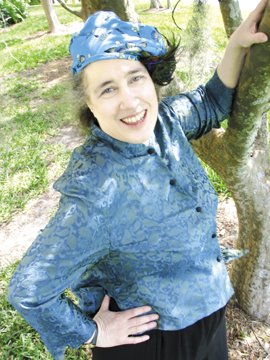Excerpts from the interview:
“Many people have used ballads as sources of literary fantasy. I use ballads, but in shreds and patches, along with things I've read, word etymologies, a lot of dialect -- my writing is both folk and baroque. I've got these great slabs of rhapsody and blots of vernacular. I think I use a fairly low percentage of Norman French-Latinate English, simply because I love the old root stock of the language. There are a scattering of words in my books I've made up on models from root stock. I love words passionately! (Maybe I should have been a philologist.) I discovered the Oxford English Dictionary at college, and spent all my time in the English students' lounge reading their copy.
“My language is intense, I know -- I like to say I do everything Joyce did, only backward and in high heels. I write for the ear as much as for the eye. Shakespeare (lucky bastard) got to write for the theater, so he got to have his words spoken. Jeffrey Ford blogged and said he went to a reading of mine and it was a revelation: 'What seemed previously to be the complexities were transformed into music and were no longer difficult at all... Her stories are like the earliest stories, meant to be sung.' And he could understand it as a piece of music.
“I have images, and metaphysical ideas and conceits, and I start supersaturating the solution and growing things in it -- basically a small crystal to start, and a very quick precipitation at the end. Almost anything can go into the solution, and knowing what the story is comes last. Plot is hard for me. I'm not a storyteller; I'm a world builder, a mythos builder.”
*
 “I started writing a second novel when Moonwise came out. By the end of '93, I got a computer and I keyed it in. (I must have retyped Moonwise 80 times on the manual!) But when I looked at it, I said, 'This won't do. Let's try something else.' So I ripped it all up and wrote 'Jack Daw's Pack' as it is. I’d told the seed of it -- the first scene, just like that -- to Jomsborg at a storytelling long ago. Bless them, Rob Kilheffer and Jenna Felice took it for Century.
“I started writing a second novel when Moonwise came out. By the end of '93, I got a computer and I keyed it in. (I must have retyped Moonwise 80 times on the manual!) But when I looked at it, I said, 'This won't do. Let's try something else.' So I ripped it all up and wrote 'Jack Daw's Pack' as it is. I’d told the seed of it -- the first scene, just like that -- to Jomsborg at a storytelling long ago. Bless them, Rob Kilheffer and Jenna Felice took it for Century.
“Then I started on 'A Crowd of Bone', which again goes back-story. By the time I'd finished that, I had at least a forward impetus, because it ends with 'Margaret ran on.' Unleaving is not entirely Margaret's story -- it's an ensemble piece -- but she's very much in it. She has invented a telescope and she's on the brink of a new science, but she's also a demigoddess, half constellation herself!
“I've been calling these stories the Fibonacci series, because each piece is longer. When you add together 'Jack Daw's Pack' and 'A Crowd of Bone', you get something about the size of the one I'm working on now, Unleaving. I had to start over on that one several times, because the three pieces of the sequence -- and Moonwise -- do fit together in the end but it took some doing. I had hand-carved the puzzle pieces very laboriously, but I didn't know where they fit. Is it a ship? A tree? A duck? (Because of course the box doesn't come with a picture on it.) Then I had this sudden, 'Oh, that's what I'm writing about!' moment.
“The presiding geniuses over the three stories are Hopkins, Marvell, and of course Shakespeare. Most of it is rather unlinked to time, because it's set in a time-stopped, winter-always world called Cloud, a quasi-17th-century rural North of England landscape. Because the language is so heavily Jacobean, I thought, 'All right, I'll give them more or less customs and manners and dress from the 17th century.' 'Jack Daw's Pack' is neutron-star material for this: a very dense thing. 'A Crowd of Bone' is bittersweet tragedy, but it's still a tragedy. And Unleaving is my 'late romance' -- one of those things that don't fit, a tale that isn't a comedy or a tragedy, in the mood of Cymbeline or The Tempest. I'm not worthy. I know I'm not wise enough or good enough to write a Winter's Tale, but this is how it developed for me.”


